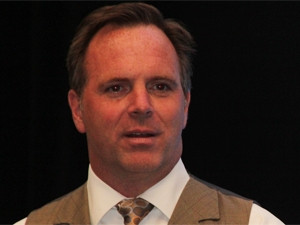
The Internet of things (IOT) - a coming trend that has been cited as disruptive - will change the way companies do business and is as big as, if not bigger than, the Internet as a technology.
So says Mark Beliveau, Software AG's VP of its Intelligent Business Operations, addressing delegates at its Innovation World 2014. He says companies will need tools to deal with this pending change.
Chief marketing officer John Bates adds if the man - or woman - on the street is not familiar with the technology, they will be soon. Bates, addressing journalists at a round table yesterday afternoon, added IOT will be as, if not more, exciting than when the Internet first arrived.
Bates notes IOT is becoming mainstream and will be a critical driver in the future for business, adding its future value may have been under-predicted. Cisco has indicated the trend will create value "at stake" of $14.4 billion.
Concerns
Head of CBT IT strategy at DBS Bank, David Walker, adds IOT will become real for customers when value is unlocked and it makes sense for consumers. "That's when the Internet of things will become real."
Walker notes the trend will add more value to customers' lives by, for example, allowing a call centre agent to intervene when a bank card has been swallowed by an ATM.
However, there are security issues with the amount of information available, such as was seen with the recent hacks on Target and Home Depot, cautions Robert Scoble, chief start-up officer at Rackspace, futurist and blogger.
Scoble adds the time will soon come when all end-users will wear data inputs, some of which will be embedded into bodies - a scenario he paints as being a mere decade away as devices are already available, but are expensive and bulky.
"We are heading into a new world," says Scoble, noting devices people wear will know more about them than themselves, such as whether someone is about to have a heart attack. "That's a very freaky world we are heading to."
Challenges
Bates adds the biggest challenge for companies dealing with the influx of data will be the software architecture needed to deal with the flood of information coming from a predicted 50 million connected devices by 2020.
There are already more connected devices than people in the world, and this will increase, says Bates. "It's like we are going to be walking around with a cloud of data around us."
Walker notes companies, like banks, need to set themselves up to be adaptive and get ready quickly for what they do not know is coming. This means thinking about capabilities and how to open them up to new capabilities.
Scoble notes the imminent change in technology will require many laws to be changed, including driving rules once self-driving cars get on the roads.
* Nicola Mawson is in New Orleans courtesy of Software AG.
Share